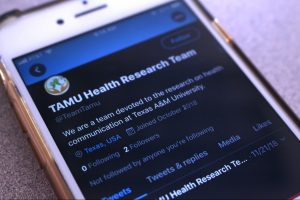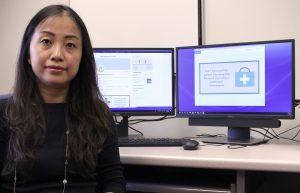Social Media Key to Public Health, Monitoring Disease Outbreak
The rise of social media in the past decade has created a more efficient way to identify disease outbreak through media platforms such as Twitter. Texas A&M health communication expert Dr. Lu Tang and her team work together to identify health behaviors, beliefs and attitudes on social media during disease outbreaks.
By Madison Brown
 In the age of technology, it is common for people to get their news from social media versus printed sources. The news users are able to access on social media has grown exponentially with popular culture, politics and even health information at readers’ fingertips.
In the age of technology, it is common for people to get their news from social media versus printed sources. The news users are able to access on social media has grown exponentially with popular culture, politics and even health information at readers’ fingertips.
Since 2016, Dr. Lu Tang, associate professor for the Department of Communication at Texas A&M, has been helping educate the public about infectious diseases and vaccines through social media. The rapid rise of these platforms over the past decade also has provided a more efficient way to identify disease outbreak by monitoring media platforms such as Twitter, said Dr. Tang. Together, the professor and her team look at health behaviors, beliefs and attitudes on social media.

“I would like to understand the public’s health behaviors and health attitudes as reflected through an analysis of their social media content,” said Dr. Tang, “with the goal of eventually providing personalized or tailored health promotion messages to combat misinformation and promote health on social media.”
Social media users are prone to bias and misinformation due to an echo chamber effect, said Dr. Tang. They are going to see the information that their friends are seeing and are more likely to agree with this information, she explained. As a result of this echo chamber, bias and misinformation can occur.
“I’m interested in social media in terms of looking at what people are talking about, but also in terms of identifying misinformation about health,” said Dr. Tang.
In order to find posts on social media about health and vaccines, Dr. Tang and her team created a “golden standard” as the first step to outbreak surveillance, said Dr. Tang. The team manually coded several thousand Tweets to identify the tone of social media posts about infectious disease and vaccines. After they created the golden standard, the team trained a computer program to automatically classify a huge amount of social media posts, she explained.
“By using big data approach, we can map how people talk about, which represents how people think about, [vaccines] before, during and after a big outbreak,” said Dr. Tang.
As the health field grows, Dr. Tang said she recognizes the importance of developing new public education about medicine as a science to help people achieve health and stay healthy.
“As a country, the United States spends the most amount of money on health care,” said Dr. Tang. “However, even if we have the best drugs, the best medical devices, best hospitals in the world, if people do not understand how to be healthy … they are not going to be healthy despite all the fancy infrastructure, the drugs and the research that we have,” she explained.
Dr. Tang said the best part of her research on outbreak surveillance is the positive impact she is able to create.
“The scale of impact of the Health Communication field is the most attractive to me,” said Dr. Tang. “You can make a difference.”
- Dept News
- Faculty
- Research
- Uncategorized
- Bias
- Communication Skills
- Computer Program
- covid
- COVID-19
- Department of Communications
- Dr. Lu Tang Texas A&M University
- Dr. Tang
- Faculty
- Golden Standard
- Health
- Health Communication
- Health Communication Research
- Health Research
- Health Research TAMU
- In the News
- Infectious Disease
- Lu Tang
- Madison Brown
- Misinformation
- Outbreak
- Outbreak Surveillance
- Pandemic
- Professor of Communications
- Public Education
- Public Health
- Public Health Education
- Research
- Social Media
- Social Media Texas A&M
- TAMU
- Texas A&M Communications
- Texas A&M COVID
- Texas A&M Infectious Diseases
- Texas A&M Lu Tang
- Texas A&M Public Health
- Texas A&M University
- Tweets
- Vaccines
